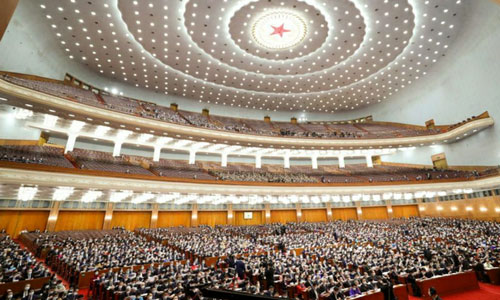A fascinating week in China is upon us with the arrival of the National People’s Congress (NPC) annual meeting and, much, much more.
Comparing a few aspects of the legislative process and results witnessed in China and the US, the two most important and lately most adversarial countries in the world is an activity well worth engaging in as China rolls out its 14th Five-Year Plan (2021-25).
Let’s begin by citing a few key points for understanding according to an excellent report titled, “The National People’s Congress: Functions and Membership,” written by Tony Saich, director of the Ash Center for Democratic Governance and Innovation at Harvard Kennedy School: “The NPC (with close to 3,000 members) does not function as a legislature in the way that it would function in the US Congress or the British Houses of Parliament.”
Indeed, it is the 150 or so members of the NPC Standing Committee who are “actively engaged in law-making and amendments of laws.”
However, the NPC also has a wide range of powers such as the power to amend the constitution, approve the national economic plan and budget, the appointment of senior state officials and many others.
I’m getting a bit bored with so much talk about structure and am far more interested in what matters in the real world: priorities, actions and results.
In this respect, China’s most important annual meeting mapping out its development path for the next five years is a leading model of governance in stability and capability, whether anti-China pundits like it or not.
Many accusers suggest that China’s system of government is that of an intimidating rigid totalitarian regime.
Yet, they ignore the fact that over the past twenty plus years it has been in an evolutionary cycle of policy and legislative transformation responsive to the needs of its society.
Priorities and results clearly inform us that the US government has evolved from its admirably intended form as an ideal democracy into a corrupted plutocracy. There has been no joy nor pleasure in witnessing this deterioration.
Decisions are made with a clear bias and priority to bail out the highest corporate level institutions and banks first, the problem being of course that the billions in bailout money never seems to trickle down the way it was intended to do below the wealth line of “the 9.9 percent” as well described by Matthew Stewart in his June 2018 article in The Atlantic magazine.
As Stewart puts it, “We are the principal accomplices in a process that is slowly strangling the economy, destabilizing American politics, and eroding democracy.”
Of course it is House and Senate more responsible than any other factor in the eroding democracy he is referring to.
The continuing refusal to address the wealth inequality created by their laws increases the threat of instability even far beyond US shores.
We may also recall even witnessing this problem clearly with the announcement of former president Trump’s much vaunted tax cut scheme.
It was later reported that Trump’s tax cuts was mostly used not to benefit employees, not to raise stagnant wages or as R&D or capital investment, but simply for stock share buybacks to boost the company’s stock price.
Such an affront to the needs of society before the interests of the wealthy class on such a grand scale would never be tolerated by the NPC.
The gathering of the two sessions offers a stark reminder of the current contrasts between the Chinese and US political systems which have seemed to move in opposite directions over the past three decades in terms of stability, capability and corruption.
The US Congress and Senate is now beholden to its corporate, lobbyist and billionaire benefactors with laws legislated into existence rendering such corruption as legal in practice, no matter the devastating effect on the society and economy.
If you’re still not clear about my meaning, let’s ask: Does a government which allows over two decades of flat wages for households while at the same time allow multi-billionaires to make multi-billions more in just a single day on Wall Street sound like a government that’s doing its job?
What this means in terms of the value of “the right to vote” is the right to choose the worst of two corrupted party members, drastically reducing the original meaning and value of the vote as the admirable Founding Fathers of the US intended.
Political idealism and the moral high ground doesn’t cut it in comparison to policies addressing real needs and getting real results.
To me, that’s the message of this year’s gathering of the National People’s Congress and two sessions.
[The author is author, advisor & CEO, M Communications Group. He has lived in China for 21 years. [email protected]]










